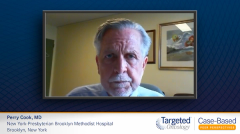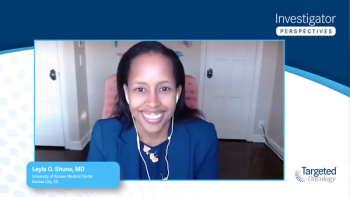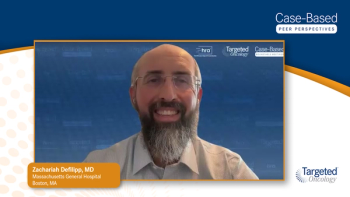
Molecular Testing in Follicular Lymphoma
Perry Cook, MD, reviews the role of molecular testing and biomarkers in treatment selection in patients with follicular lymphoma.
Episodes in this series

Perry Cook, MD: The role of molecular testing in follicular lymphoma is less well defined, than it is, say, in CLL [chronic lymphocytic leukemia], where we choose optimal therapy based on the FISH [fluorescence in situ hybridization] profile and other characteristics. In follicular lymphoma, it is certainly useful in considering the use of EZH2-directed therapy, but again, EZH2-directed therapy is appropriate for patients who are both wild type and mutated, and it’s primarily important in patients who are early progressors and for who you might prefer to use EZH2-directed therapy in the second line. To do that, you’d have to know that the patient is EZH2 wild type to conform to the FDA guidelines.
How do we know the prognosis of our patients at the time of diagnosis? In reality we don’t know very well because the response to chemoimmunotherapy is highly variable, and that sensitivity to chemoimmunotherapy is not well predicted by the molecular profile. Patients who are EZH2 mutated or nonmutated experience similar responses to chemoimmunotherapy, so knowing their EZH2 status does not predict their response to first-line therapy. The FLIPI [Follicular Lymphoma International Prognostic Index] score is somewhat predictive of their outcome with chemoimmunotherapy. Those with a higher FLIPI score are less likely to do well and have less durable responses. Patients with less than 5% large cells in the mixture of cells have a better prognosis than those with more than 15%, but once again, it’s very much contingent on how chemoimmunotherapy sensitive these patients are. Some of them with all the bad prognostic features, so a high FLIPI score and high burden of large cells will nonetheless do very well with induction therapy and enjoy long remissions. Conversely, some patients with low FLIPI scores and few large cells will do poorly, so we really don’t know the prognosis until we start therapy. EZH2 is something we haven’t routinely determined, until recently; it doesn’t seem to predict for response to chemoimmunotherapy, but it does predict for response EZH2-directed therapy. As this becomes more routinely used, I would anticipate that EZH2 determination would become a more routine part of our assessment of patients with follicular lymphoma.
What are the viable first-line therapy options? I think my initial response was chemoimmunotherapy, and this should perhaps be amended to include immunotherapy with IMiD [immunomodulatory imide drug]therapy. Lenalidomide with rituximab or obinutuzumab is a category 2A NCCN [National Comprehensive Cancer Network] recommendation, so that is another first-line alternative for patients. Finally, the extremely frail patient could be considered for radioimmunotherapy in the first line. The NCCN recognizes that as an outlier for patients with extreme comorbidities, who are symptomatic and require treatment for follicular lymphoma, and might be judged too ill tolerate alternative therapies. I think that would complete the options. Chemoimmunotherapy for most patients, immunotherapy plus an IMiD for some patients, and radioisotopes for very few patients.
Maintenance therapy has been demonstrated to prolong the duration of the first response but may not impact on the overall survival of patients. I use it routinely because of my perceived impression that patients are happier and have a better quality of life if they are in their first remission. If we can make that first remission last longer, we may bridge it to the next better therapy. Tazemetostat, for example, is proof of the possibility that we’ll have new and better therapies in the future. To live long enough to receive the next therapy is probably a good thing. For the majority of patients, I will offer maintenance therapy, with the caveat that it doesn’t necessarily improve survival.
This transcript has been edited for clarity.
Case: A 76-Year-Old Man With Relapsed/Refractory Follicular Lymphoma
Initial presentation
- A 76-year-old man complains of a 4-month history of bloating, fevers, and unintended weight loss of 9 lbs
- PMH: Medically-controlled hypertension, brittle diabetes, CABG 10 years prior
- SH: Lives by himself 2.5 hours from the clinic; only daughter lives out of state
- PE: palpable right axillary lymph nodes, ~ 3 cm and bilateral cervical lymph nodes, ~ 2 cm; spleen palpable 4.5 cm below left costal margin
Clinical workup
- Labs: ANC 1.6 x 109/L, WBC 11.4 x 109/L, 45% lymphocytes, Hb 9.5 g/dL, plt 96 x 109/L, LDH 426 U/L, B2M 3.4 µg/mL; HBV negative
- GFR 59 ml/min
- Excisional biopsy of the axillary lymph node on IHC showed CD 20+, CD 3+, CD5+, CD 10+, BCL2+; follicular lymphoma grade 2
- Bone marrow biopsy showed paratrabecular lymphoid aggregates, 42% involvement
- Cytogenetics: t(14;18) (q32;q21)
- Molecular testing: EZH2 wild type
- PET/CT showed right axillary, bilateral cervical, and mediastinal lymphadenopathy (3.3 cm, 3.4, cm and 2.6 cm, and 3.2 respectively)
- Ann Arbor Stage IV; ECOG 1
Treatment
- He was treated with bendamustine and rituximab for 6 cycles, achieved complete response and continued on rituximab maintenance
- Side effects included grade 3 diarrhea with BR
- 16 months later he complained of fevers and chills with increasing frequency
- Repeat PET/CT revealed progression of disease
- He received R-CHOP for 6 cycles and continued on rituximab maintenance
- 11 months later he had worsening fatigue and increased weight loss and work up revealed progressive disease
- He was started on tazemetostat 800 mg BID



















